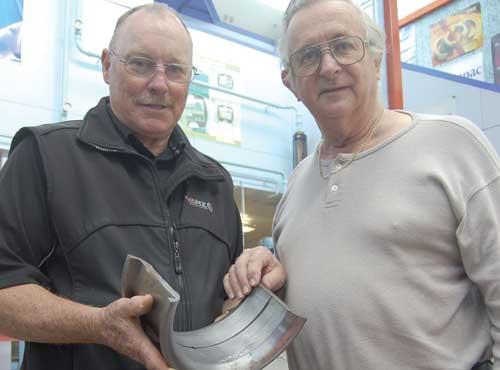A lack of knowledge has led to poor lubrication practices in the industry, says Richard J. Clancy, who asks for increased awareness of and education on the importance of this subject.
DEMM: Oil is the lifeblood of machines, but lubrication seems to have a bad reputation with many people or plays a secondary role in maintenance activities. Why is that so?
RJC: I believe it comes down to education. Few technical colleges or universities have tribology as a subject, yet they have subjects such as strength of materials, thermodynamics etc., which are all necessary for a practicing mechanical engineer. However, there is no machinery that does not require some form of lubrication, so when an engineer graduates and is exposed to the practical situation in the workplace, they do not have a basis on which to draw upon and can only make decisions based on assumptions and hearsay. Also, the oil industry is plagued by ‘snake-oil salesmen’ who at times offer unrealistic performances from their products and the engineer does not have the training to adjudicate whether the claims are factual.
DEMM: Who else needs to be educated?
RJC: All people in industry need to be educated about the importance of correct lubrication. Managers need to know the effect of poor lubricant selection and maintenance, especially elimination of contaminants, plus the cost that can be saved due to correct lubrication. Purchasing officers need to know the benefits of correct lubricants – such as overall benefits of synthetic oils – even though they are more expensive per litre to purchase.
Design engineers need to be familiar with the requirements of correct lubrication, such as design of reservoirs to eliminate dirt and water contaminants, plus correct oil sampling and drain schedules. They should also be able to understand an oil analysis report and the implications of the results for their machinery.
Maintenance fitters must be aware of the implications of lubrication for their machinery, and cleanliness when they are repairing machinery. What has the lubricant told them when they are repairing machinery? Has there been sufficient oil – or grease? – or too much? Is the lubricant ‘cooked’ or dirty? Are the seals allowing contaminants into the lubricant?
Lubrication mechanics, who are often the first person to notice something wrong with the machinery which they lubricate, need to have basic knowledge of the implications of incorrect lubrication.
All need to appreciate the importance of correct lubrication and the effect on the profitability of their company, which means – ultimately, their own jobs!
DEMM: What are some of the most important principles people need to know about lubrication?
RJC: I’d like to emphasise that contaminated lubricants are a killer for machinery life. The opportunity for contamination starts in the lube store. We would refuse to eat food from a shop if we saw that it was stored in an unhygienic manner. Lubricants are like food for the machinery and should be stored and distributed with the same care and concern. Oil stocks should be rotated and dispensed – last in, first out – to ensure oil does not stay on the shelf for long periods such as years. Excellent oil dispensing containers are sold by a number of suppliers and should be used. They reduce the chance of contamination and are easily cleaned. Grease dispensed by means of a cartridge eliminates dirt contamination which can often occur during filling of a grease gun by manual means.
Automatic lubrication systems can eliminate the human factor, but still need to be monitored. Single-point lubricators often provide an economical choice for lubrication of machinery located in hard-to-access areas. However, like all machinery they also need to be installed correctly and monitored.
DEMM: It has been estimated that it costs between five to ten times more to take contamination than to prevent it in the first place.
RJC: This fact should be appreciated by all levels of management. The smallest size of particle that can be viewed with the naked eye is 40 microns, whereas the oil film thickness between a rolling element and the bearing raceway is between 0.1 to 1.0 microns, so if oil has ‘glinty bits’ in it, it will cause rapid wear and rough running for the rolling element bearing.
DEMM: It’s pretty obvious that under-lubrication can harm a bearing or a machine. How dangerous is over-lubrication?
RJC: Over-lubrication can be just as detrimental to the life of a rolling element bearing as under-lubrication. If too much grease is applied, the bearing will develop excessive heat, which may cause the grease to harden and ‘cook’. Too much grease in a bearing might cause the seals to ‘pop’, or be displaced from their housing, and then contaminants will enter, dramatically shortening the life of the bearings. Too much oil in a bearing will result in the oil foaming due to excessive agitation, which, combined with the increased heat will lead to oxidation/burning of the oil and reduced bearing life. The same situation will occur in gearboxes, due to increased agitation of the oil. Excessive oil feed to high pressure air compressors can lead to excessive deposits in intercoolers, which can cause fires and explosions.
DEMM: How big is the problem of counterfeit lubricants, and what can be done?
RJC: This is an ‘underground-type’ situation. Counterfeit lubricants are generally only detected when machinery malfunctions. Used drums can be bought and refilled with lubricant that looks like the product as marked on the drum, but the performance may be far less than that of the stated product. The problem has been experienced in Indonesia and was responsible for failures of transmissions. The oil was found to be recycled transformer oil, dyed red and filled into a drum that had previously contained transmission oil (ATF) – which is also red in colour. The fake oil was able to be identified in the laboratory by standard spectroscopy as having none of the additives necessary for an ATF. My advice is to purchase only from a reputable supplier or a distributor of such a supplier which has been authorised to sell those products. Be cautious of the ‘cheap deal’, you may well get what you pay for!
DEMM: What about counterfeit bearings?
RJC: Bearings are expensive items and the attraction for a counterfeiter to produce a ‘lookalike’ is huge. Much time and research goes into the development of a bearing, which takes into consideration the quality of the steel, the method of manufacture, the surface finish – especially of the rolling raceways and the rolling elements, the quality and design of the cage (if fitted), the seals (if fitted), and any lubricant if it is pre-lubricated and sealed. Any variation in any one of these factors may give rise to a shorter bearing life than that of a reputable manufacturer. Be careful of the ‘special deal’. The cost of downtime usually far exceeds the cost of the bearings. Generally the problem is only identified when there is a failure or unusually short bearing life and then it can take a very expensive and extensive investigation to identify that a bearing is counterfeit and the downtime has already been lost. Here applies the same rule: Buy only from a reputable bearing supplier or their nominated agent or distributor.






